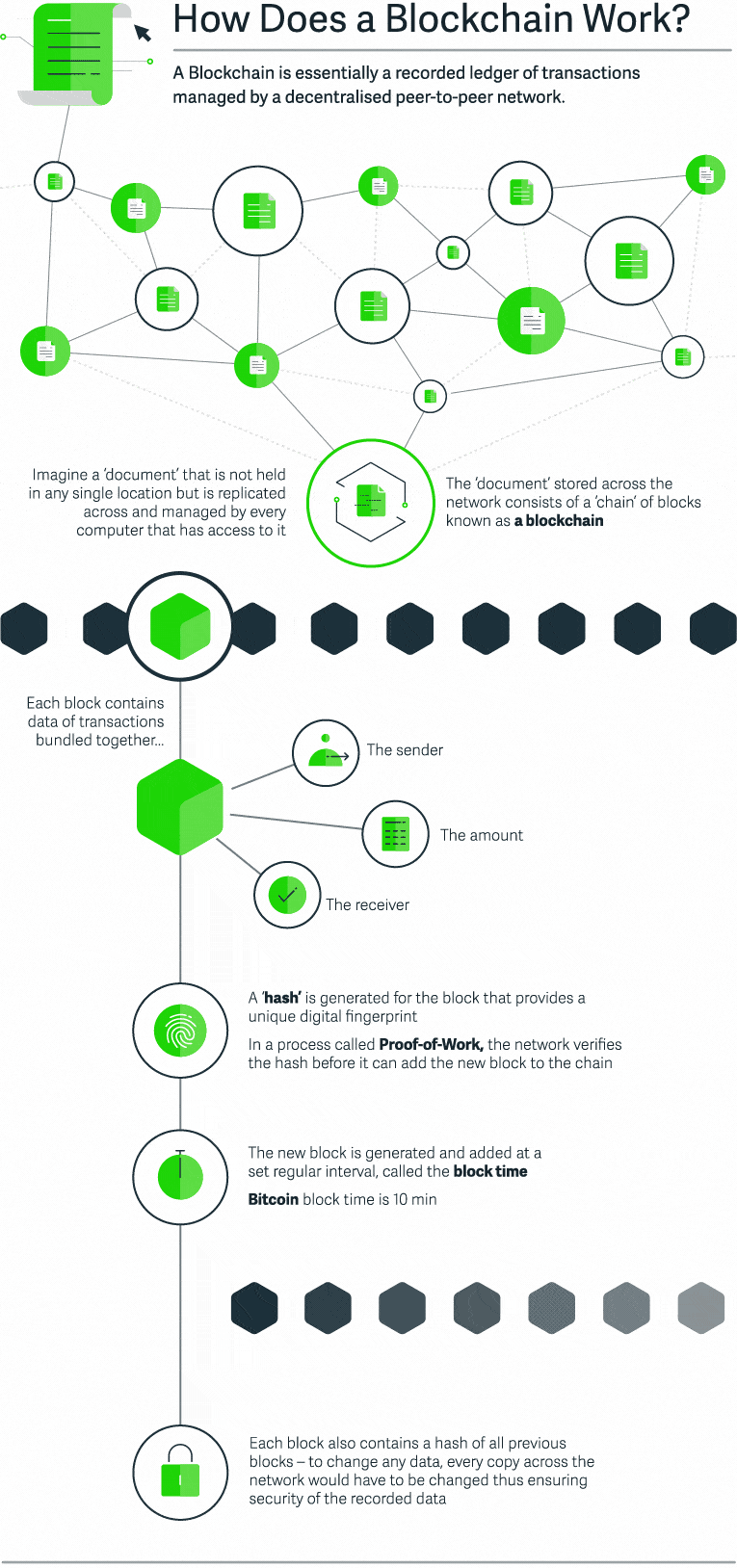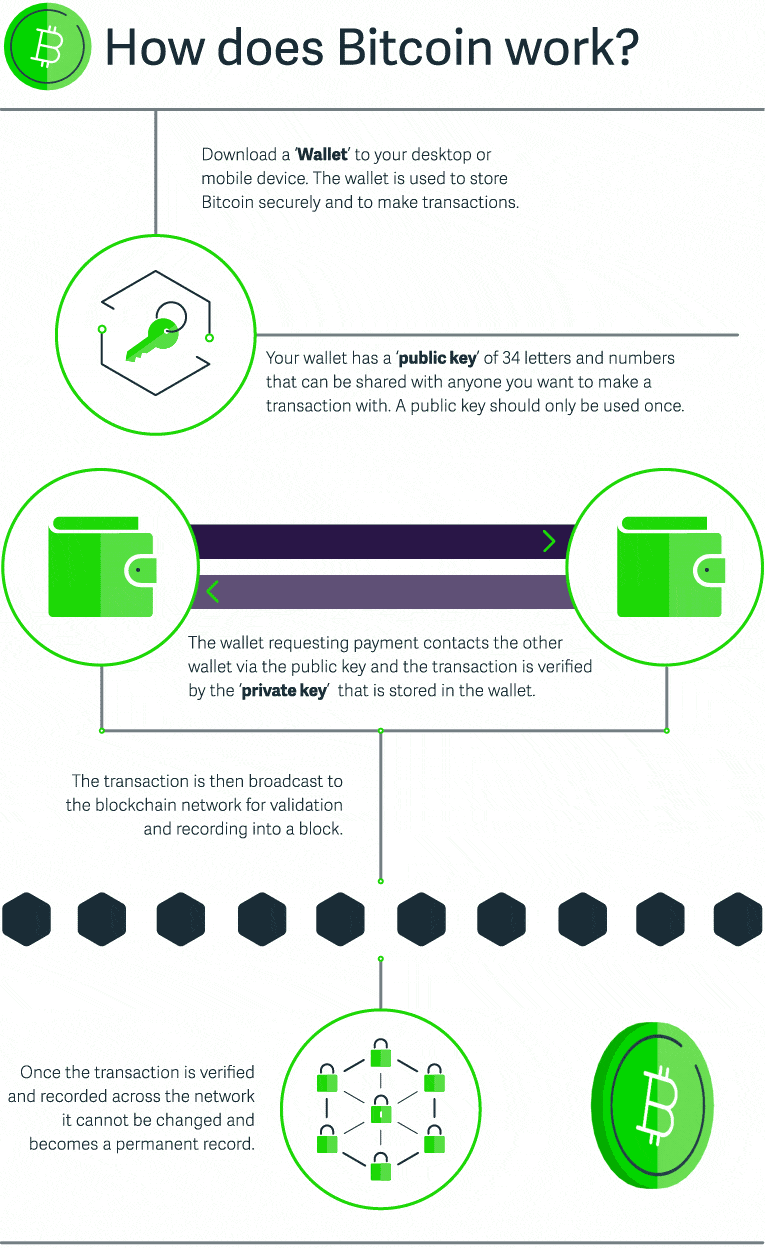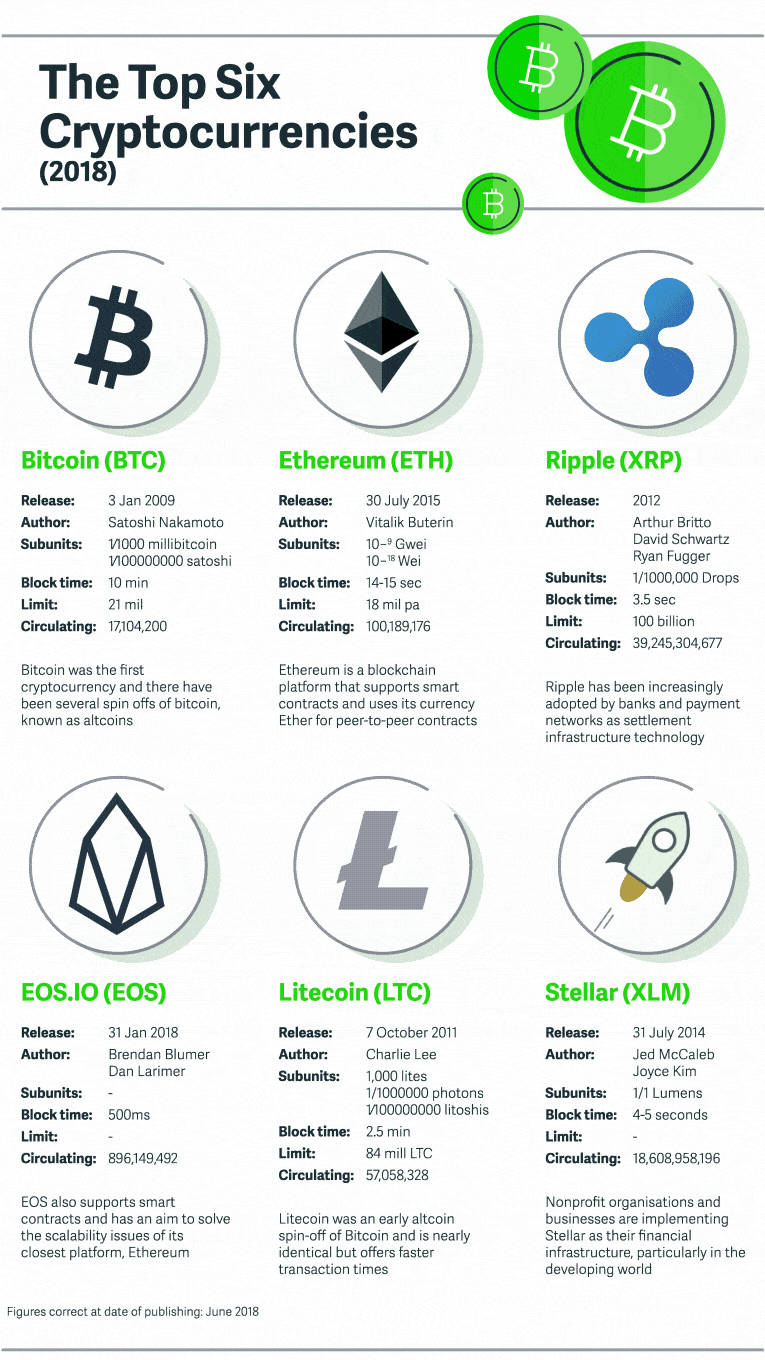Interested in using blockchain, cryptocurrency and Bitcoin for your business but not sure where to start? This comprehensive guide covers the basics about these emerging technologies and reveals what they could mean for your company.

What is a blockchain?
The Bitcoin Blockchain is essentially a recorded ledger of transactions managed by a decentralised peer-to-peer network.
How does the Blockchain work?
Imagine a document that is not held in any single location but is replicated across and managed by every computer that has access to it in the ultimate, democratised system.
The Blockchain consists of a sequence of ‘blocks’ that consist of recorded data. In each block there is a record of the transactions made since the last block was created, this includes details of the sender, the receiver and the transaction amount.
The block also contains a hash that provides a unique digital fingerprint for a given piece of data. A hash is produced by a complex mathematical equation.
For a new block to be recorded, it employs a process called Proof-of-Work. This involves the network verifying the block hash before it can be added to the chain.
A new block is generated and added at a set regular interval, called the block time; Bitcoin block time is set to 10 minutes.

How secure is the Blockchain?
Each block contains a hash of all previous blocks. Therefore, to change a data record every copy on the network and every preceding copy stored in the chain would have to be changed, ensuring security of the data recorded.
As the Blockchain is not held on a single server or controlled by a single entity, it has no single point of failure and cannot be hacked.
How can blockchain technology be applied?
Existing block chain (originally two words) technology was developed in 2008 by Satoshi Nakamoto (whose identity is yet unknown and this may be a pseudonym used by a single person or a group) to support cryptocurrency, specifically Bitcoin, as a public ledger to record transactions of Bitcoin cryptocurrency.
![]()
Aside from cryptocurrency, blockchain technology has huge potential for many other applications that involve the recording and management of any data of value. Imagine public records such as land registry; private records such as medical records and identity documents; contracts and voting all easily accessible and updated by anyone on the network but protected from manipulation and fraud.
Much like the internet, blockchain technology is going to have a huge impact and businesses should not ignore or underestimate the digital evolution. By its nature both of removing the need for a third party and the security of recording sensitive data, there is a possibility to change how all transaction and data recording is conducted.
What is cryptocurrency?
At a basic level, a cryptocurrency exists as an entry in a database that cannot be changed. It is the record of an agreed transaction that has taken place.
Much like Fiat Money, which the traditional currency system is based upon, the actual monetary ‘coin’ has no value of its own but instead is based upon the agreed value of a transaction between two parties for an exchange of some kind. A recording of the transaction offers validation to secure the transaction.
Cryptocurrency in itself has no value but maintains its value by its verifiable record.
Historically, the challenge for creating a digital currency has always been in how the record of the transaction would be securely held and how to avoid double-spending, without the intervention of a third-party centralised bank or institution.
Satoshi Nakamoto solved this problem with the Blockchain as the foundation to support Bitcoin:
“Announcing the first release of Bitcoin, a new electronic cash system that uses a peer-to-peer network to prevent double-spending. It’s completely decentralized with no server or central authority.” – Satoshi Nakamoto, 9 January 2009, announcing Bitcoin
Bitcoin was the first, and remains the most well-known cryptocurrency.
The ledger for Bitcoin was started when the first block was generated (known as the genesis block) on the 3rd January 2009 and has been limited to a maximum creation of 21 million coins.

How does Bitcoin work?
To get started with Bitcoin you would first need to download a Bitcoin ‘wallet’ to your desktop or mobile device. The wallet is used to both store Bitcoin securely and to make transactions.
Your wallet generates ‘public keys’ of 34 letters and numbers (think of this as an email address) that can be shared with anyone you want to make a transaction with. Addresses should only be used once.
When making a transaction, two wallets will connect with each other via the ‘public key’ and then the transaction is signed off by the ‘private key’ (think of this as a PIN or password) which is stored in the wallet releasing the funds.
Once a transaction has been made, it’s broadcast to the Blockchain network for recording. This is the ‘mining’ process that involves validating the transaction and recording it into a block.
Once the transaction is verified and recorded across the network, it cannot be changed and becomes a permanent record.
How is cryptocurrency created (mined)?
Mining is the process of verifying cryptocurrency transactions and recording them in a block.
The process is conducted by the peer-to-peer network who use their computer processing power to complete the complex mathematical problem that generates the ‘hash’ to verify and secure the transactions.
This process is purposefully difficult and long-winded to ensure security, and for their efforts miners are rewarded with new Bitcoin when a new block is recorded.
This is the only way a Bitcoin can be generated. Bitcoin is limited to 21 million coins.
In the early years of Bitcoin, it was possible for someone at home with a computer that met the specification to ‘mine’ and use their processing power to be rewarded with Bitcoin. As mining has become more intensive, individual machines are pooled to share their processing power.
Unless you can manage the huge energy costs for the processing power and the cooling required, mining cryptocurrency has become a negative earner and has also sparked much criticism and debate over the excessive energy consumption.
These concerns saw China make a move to shut down local Bitcoin exchanges and also to ban initial coin offerings in an attempt to contain the explosion of Bitcoin miners the country had seen.
How secure is Bitcoin?
The blockchain that supports Bitcoin by recording transactions is inherently secure through its use of a decentralised network, as there is no single point of failure that can be exploited.
Storage of cryptocurrency and Bitcoin is where any weakness can lie because the digital data you hold cannot be replicated – if it’s lost or stolen it cannot be replaced. Therefore, using secure, trusted storage methods and backups are essential.
Due to the increasing value of cryptocurrency, it is also a target for hackers but hacks can only be made on exchanges or on personal storage devices and not on the Bitcoin Blockchain itself.
What are the different types of cryptocurrency?
At the beginning of 2018, there were over 1,500 cryptocurrencies – Bitcoin being the most well-known.
The largest cryptocurrencies currently on the market are as follows:

How do I buy and exchange money into cryptocurrency?
If you are ready to start buying and selling with Bitcoin, firstly, you need a secure wallet.
Consider a digital wallet much like a traditional wallet and bank account: would you normally hold £1,000 in hard cash in your pocket? Your mobile device becomes a purse for spending money and your desktop wallet or hardware wallet is a bank account to securely store funds.
Whatever option you choose, you should consider that the only inherent weakness in Bitcon is the storage method, as Bitcoins can’t be recovered if stolen or lost through corrupted files. Any system that is open online is more vulnerable to being hacked.
The different types of cryptocurrency wallets
![]()
Desktop wallet
Installed onto the hard drive of your computer and can only be accessed by your computer. The private key for your wallet is stored on your computer. It’s essential to back-up and maintain this wallet as your coins can be lost if the device or its files are corrupted.
Your computer can be hacked via malware if you connect to the internet or insert corrupted files.
Online wallets
A cloud-based storage wallet that can be accessed from any device and which offers convenience for spending on your mobile device. This type of wallet is the least secure as your private key is stored in the cloud.
Mobile wallets
An app that is installed on to your mobile phone for convenient payments on the go. The private key is stored on the phone, so your coins are only as secure as your phone. This type of wallet can be susceptible to hacks, loss or theft.
Hardware wallets
A small external device, such as a USB stick that only connects to the internet when you make a transaction. Because it’s offline for most of the time, this is the most secure storage method.
However, if the device is lost or stolen, so are your coins. Large investors are known to keep their hardware wallet in a bank vault.
Paper wallets
A piece of paper that has the public and private keys written on them. The benefit is that they can be stored long-term offline and can be given as gifts but they are vulnerable to being destroyed through fire, water or a hungry pet!
A hardware wallet stored in a secure location is considered the most secure means to store Bitcoin and is recommended for large investments.
Just like you keep most of your money in a bank and then carry small amounts in your pocket for spending, the approach of using different devices for storage is the smartest option.
Load a small amount on to a mobile wallet for payments on-the-go and then keep the majority of funds securely stored offline with back-ups.
There are three ways to buy cryptocurrency or Bitcoin
An exchange
An online site that will buy and sell on your behalf for a fee, such as Coinbase. Payments are made by bank transfer or a credit card and verification by ID is required, removing any anonymity that cryptocurrency usually affords.
Sellers in your community
An online platform where buyers and sellers can connect. For a local buyer, you can exchange in person for cash maintaining anonymity but this is not recommended for the obvious reason of being scammed.
An ATM or Bitcoin store
A terminal where you can input cash to receive a QR code to load coins into your wallet. ATMs don’t require ID and remain anonymous. A list of Bitcoin ATMs in the UK can be found here.
Who is using Bitcoin?
Cryptocurrency is gradually being integrated into society around the edges but full adoption is expected to take many years.
There have been some reports on who is currently using Bitcoin. Results are a little inconsistent but generally, adopters are men under the age of 34. Tech savvy millennials are considered to be a key demographic.
A few progressive suppliers are accepting Bitcoin but many more need to embrace the new payment method to offer confidence to purchasers and to increase adoption of the digital currency.
Expedia travel agency are one of the most high-profile brands online to accept Bitcoin.
How to accept Bitcoin payments
Many small ‘bricks and mortar’ stores are dipping their toe with the new technology and are offering Bitcoin as a payment method. A quick search of stores in the London area shows a handful of businesses ranging from cafés, garden stores, newsagents, law firms, estate agents and office space being early adopters of the digital currency.
If you’re a business that wants to experiment with the digital currency there are a few options:
For payments online, Bitcoin payments can be integrated into your ecommerce store. Bitpay and Coinbase are two market leaders that easily allow digital payments.
The Shopify platform offers all its merchants the option of accepting payment in Bitcoin.
Person-to-person payments
Consider this as a cash payment – a customer would send a payment from their digital wallet to yours.
A straightforward option that enables a small business to test and embrace the technology without any significant investment.
Point-of-sale (POS) merchant solution
The use of a specific merchant commerce solution that enables a store to accept Bitcoin, much the same as any other POS system – usually an iPad-style terminal. Coinify is one of the current market leaders. However, this does involve fees payable to the POS merchant.
How can I get my business ready to accept cryptocurrency?
To test the demand for Bitcoin for your business, you can simply display a sign that says ‘Bitcoin accepted here’ and see what response you get.
To start receiving payments, begin by using person-to-person payments that only require an app on your mobile with no significant investment or commitment.
If you are a high-volume, small-item trader, such as a coffee shop, consider exchanging Bitcoin for a gift card to avoid delays in taking payments for a single coffee at the till and also, to reduce accounting.
When sales increase to a consistent amount, then investment in a POS solution would be the next step if you are trading enough to cover the fees.
For service-based businesses who charge customers by invoice, you can offer Bitcoin as a payment by generating a public key for each invoice. This will enable your customers to make a direct wallet payment.
Worth consideration is how you will handle cryptocurrency exchange rates that are currently susceptible to fluctuations. Do you quote a job in Bitcoin even though the exchange rate may change considerably over a month before it is paid – or, do you quote in GBP and accept the Bitcoin exchange at the point of transaction?
Can cryptocurrency be taxed and how is it recorded in my accounts?
HMRC announced guidance in 2014 on how it treats cryptocurrency for tax purposes.
In brief, the sterling value of the goods paid for in Bitcoin at the point of when the sale was made is subject to VAT in the standard manner:
“VAT will be due in the normal way from suppliers of any goods or services sold in exchange for Bitcoin or other similar cryptocurrency. The value of the supply of goods or services on which VAT is due will be the sterling value of the cryptocurrency at the point the transaction takes place” – HMRC
For accounting purposes, Bitcoin should be treated as a currency conversion at the time of the sale and recorded in that manner.
We recommend seeking advice from an accountant who understands cryptocurrency and a call to HMRC to clarify the most up-to-date rules for recording cryptocurrency takings.
What are the benefits of accepting Bitcoin as a payment method?
As Bitcoin has traded originally on an image of anonymity and anti-establishment, many businesses have questioned if it’s legal or ethical – is it a way of avoiding tax?
Bitcoin and cryptocurrency is currently unregulated but it is a secure method of payment. Also, it offers an exciting alternative to traditional currency systems in that it can overcome barriers of trade.
![]()
Lower fees – Bitcoin has lower transaction fees than credit cards and removes the need for bank charges if cryptocurrency is not exchanged.
Reduce fraud – once a payment has been confirmed, it cannot be reversed. Chargebacks, which have been the scourge of credit card payments, are eradicated.
Instant payment – a payment by credit card can take several days (or even weeks) to show as cash in the bank. Cryptocurrency is an instant transfer.
Removes barriers – cryptocurrency opens up international trade and removes trade barriers and restrictions, and reduces the difficulty of making or accepting payments in a different currency.
Attract more customers – the novelty of accepting or paying with Bitcoin could attract new customers to your business.
Edge on your competitors – by embracing new technology, you can leverage an edge on your competitors who are left to catch up.
After its early adoption on the dark web, cryptocurrency is now filtering into society and any business should be carefully monitoring its development and considering how it can be applied to benefit their business.
By embracing the digital currency technology, a company could gain an edge on their competitors or attract new business through a progressive attitude.
However you perceive the digital currency, Bitcoin is highly unlikely to disappear and is increasingly moving towards mainstream adoption at some point in the not-too-distant future.
The Business Transformation Network has posted this article in partnership with Sage
References
https://bitcoin.org/bitcoin.pdf
https://en.wikipedia.org/wiki/Bitcoin
https://en.wikipedia.org/wiki/Blockchain
https://en.wikipedia.org/wiki/Cryptocurrency
https://coinmarketcap.com/all/views/all/

